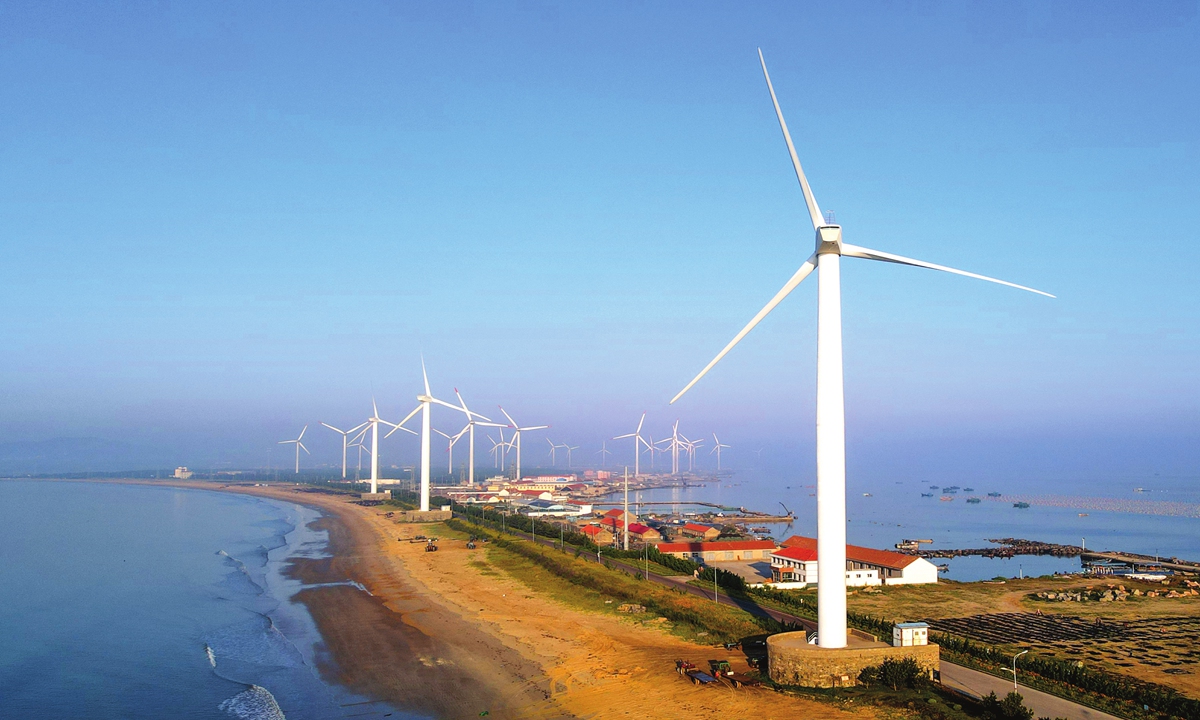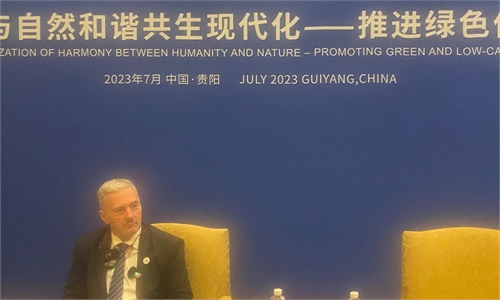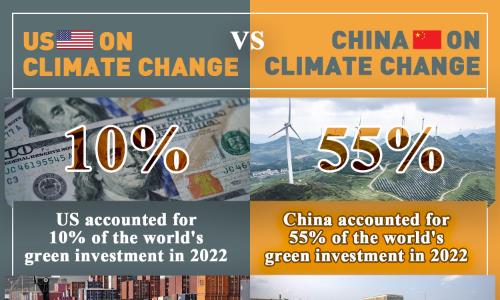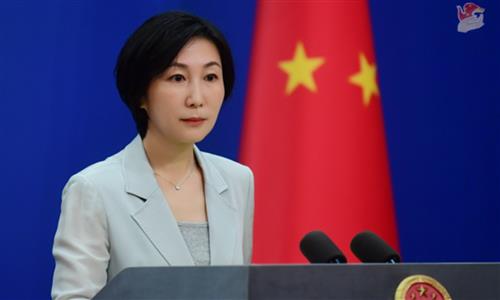The US aims to deprive China’s legitimate right of development by attempting to revoke its developing country status: experts
US aims to deprive China’s legitimate right of development and set barriers in China’s growth path: expert

Wind power generation equipment operates in Weihai, East China's Shandong Province on June 15, 2023.
Editor's Note: The US has made every effort to pin the label of "developed country" on China. In the latest example, a US politician made far-fetched and groundless claim that China skirts its responsibilities on climate change as a developing country. However, the US' moves turned out to serve its ulterior political purpose of containing China's development. This is the first in a series of stories bringing to light the US' smearing and suppression of China and presenting a true, multi-dimensional, and panoramic view of the country as a developing economy.
The US has recently ramped up efforts to try to revoke China's status as a developing country, with an American politician citing far-fetched claims that China skirts its responsibilities on climate change as a developing country.
Chinese experts said China's status as a developing country is rooted in facts and international indexes, while the US' unreasonable and malicious attack on China's status aims to contain the country's development and alienate China from the rest developing countries.
They said China has never used and will not use its developing country status to evade international responsibilities or seek preferential treatment; rather China aims to contribute more to world peace and development. It's the US that is going backwards on its climate change pledges and impedes the transition to a green energy global economy through pushing for "decoupling" and trampling on market principles and multilateral trade rules.
House Foreign Affairs Committee Chairman Michael McCaul claimed on Sunday that China has avoided its responsibility in the fight against climate change while developed countries are moving to combating carbon dioxide emissions.
He claimed that China's "developing nation" status is self-designated, which allowed China to defer the compliance of the Paris Agreements till 2060.
Regardless of the facts, the US keeps hyping up China's status as a developing country. The real motive behind the move is to deprive China's reasonable and legitimate right of development and sets barriers in China's development path, Wang Bo, dean of the School of International Development and Cooperation with University of International Business and Economics in Beijing, told the Global Times.
Status 'not decided by the US'
Since 2019, US trade representatives have repeatedly called for removal of China's status as a developing country at the WTO. In February 2020, the US eliminated its special preferences for a list of developing countries, including the Chinese mainland and the Hong Kong Special Administrative Region.
In early June this year, the US Senate Committee on Foreign Relations approved the Ending China's Developing Nation Status Act, calling for an end to treatment of China as a developing nation, Reuters reported.
"It's not a rare thing that the US sensationalizes China's developing status, but it's not up to the US to decide whether China is a developing country which is rooted in facts and international law," Wang Bo said.
Chinese Foreign Ministry on June 9 made a robust response to the US' malicious move, saying that the US can neither deny the fact that China is still a developing country, nor stop China from moving toward national rejuvenation.
According to some US lawmakers, there is concern that China continues to use its developing country status to evade international responsibilities. That is completely unnecessary. China's contribution to global economic growth and UN regular budget and peacekeeping assessments far outweighs that of most developed countries, said Wang Wenbin, a spokesperson of the Ministry of Foreign Affairs.
From 2013 to 2021, China's average contribution to world economic growth was 38.6 percent, higher than the Group of Seven countries combined. China has contributed more than 70 percent to global poverty reduction. In addition, the special and differential treatment provisions that China currently enjoys is far lower than the average level of developing countries, Wang Bo said.
"The UN has no clear definitions for the concept of developing country. However, China is still not classified as a developed country under the criteria of major organizations including the WTO and the World Bank, which cannot be revoked by any other country," Zhou Mi, deputy director of the Institute of American and Oceania Studies of the Chinese Academy of International Trade and Economic Cooperation under the Ministry of Commerce, told the Global Times on Tuesday.
In addition, it's far-fetched for the US to challenge China's developing country status under the excuse of the so-called China's limited contribution in combating climate change, as the recognition of such status is also closely related to a country's economic development stage, history background and its standing in global industrial and supply chain, Zhou said.
Although China's total economic volume has become the world's second-largest, the problem of imbalanced and uncoordinated development remains substantial and faces many bottlenecks in boosting high-quality development, experts noted.
In 2022, China's per capita GDP was $12,741, one-fifth that of developed economies and only 16.6 percent that of the US. China still stays at the lower to medium end of the global industrial chain, with GDP mainly comprised of manufacturing and agriculture, public data showed.
Given China's advantage of having a huge market and being a major trade partner of many economies, the US and other developed countries should cooperate with China based on mutual benefits to systemically handle climate change, Zhou said, urging the US to stop its selfish calculation.
Washington going backwards
"While pointing fingers on China with groundless accusations, the US itself is going backwards on climate change," Lin Boqiang, director of the China Center for Energy Economics Research at Xiamen University, told the Global Times on Tuesday.
China has enhanced its renewable energy investment over the years as part of its pursuit of green development, with the country topping the world in many fields concerning environmental conservation and low-carbon development, Lin said.
By the end of 2021, the installed capacity of renewable energy across China was more than 1 billion kilowatts, accounting for 44.8 percent of the country's overall installed capacity. The country's installed capacity of hydropower, wind power and photovoltaic power each exceeded 300 million kilowatts, all ranking first in the world, according to a white paper released by the State Council Information Office in January 2023.
In addition, the focus of the global new energy industry is gravitating toward China, with China-made photovoltaic modules, wind turbines, gear boxes and other key components accounting for 70 percent of the global market share in 2022, according to the National Energy Administration.
As the world's largest developing country, China is committed to building of a community with a shared future, insists global governance concept of extensive consultation, joint contribution and shared benefits, and drives up other countries' development. In contrast, under the America First doctrine, the US has randomly withdrawn from multilateral organizations to evade its responsibilities and hinder normal international political and economic cooperation, Wang Bo said.
The US is the first and only country that walks away from its promises to reduce greenhouse gas emissions, as former US president Donald Trump announced to withdraw from the Paris Agreement on climate change about half a year after it took effect, which seriously weakened global confidence on climate change cooperation, Lin said, noting that the US and other developed countries failed to honor their $100 billion climate finance promise.
"Rather than criticizing other countries, the US should reflect on its own practices," Wang Bo said.



